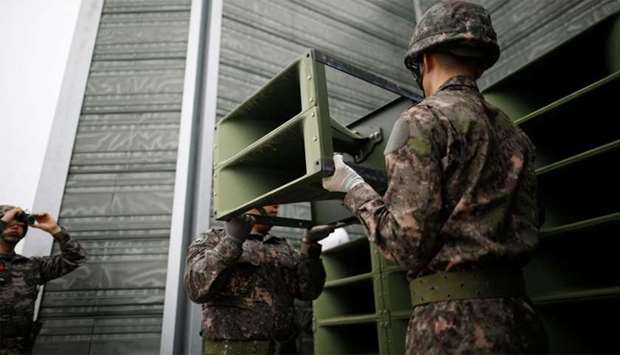North and South Korea began dismantling loudspeakers that blared propaganda across their heavily fortified border on Tuesday, South Korea's defense ministry said, fulfilling a promise made at last week's historic summit.
The moves are the first practical, if small, steps toward reconciliation and come after an agreement in the joint declaration signed at Friday's summit between South Korean President Moon Jae-in and the North's Kim Jong Un.
Activity at several spots along the border indicated North Koreans were taking down the speakers, a defense official said. South Korea started doing the same at 2 p.m. local time, he said.
For decades, with only a few breaks, the two sides have pumped out propaganda from huge banks of speakers as a form of psychological warfare. The South broadcast a mixture of news, Korean pop songs and criticism of the northern regime, while the North blasted the southern government and praised its own socialist system.
As a sign of goodwill, the South had stopped its propaganda ahead of the summit, and the North followed suit.
In another small sign after Friday's summit, North Korea said Monday it would shift its clocks forward half an hour to align with its southern neighbour starting May 5.
The incremental steps come amid speculation about where Kim will meet US President Donald Trump, who said their planned summit could take place in three or four weeks.
Trump tweeted Monday that meeting Kim at the Peace House in the demilitarized zone, where Moon met Kim, would be an excellent venue.
‘There's something that I like about it because you're there, you're actually there. Where, if things work out, there's a great celebration to be had on the site, not in a third-party country,’ Trump later told reporters at the White House.
But a senior US official said Singapore was still high on the list of potential sites.
Singapore Prime Minister Lee Hsien Loong said on Saturday Singapore had not had any request to host the Kim-Trump meeting.
South Korea's presidential Blue House seemed to welcome the prospect of hosting the meeting in Panmunjom, the border village where the Peace House is located.
‘Panmunjom is quite meaningful as a place to erode the divide and establish a new milestone for peace,’ a senior presidential official told reporters, asking not be identified because of the sensitivity of the matter. ‘Wouldn't Panmunjom be the most symbolic place?’



